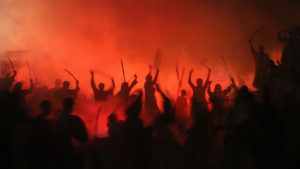
Criticism on Fridays: Opera Journalism in Times of Crisis
When No Question is Too Serious
By Polina Lyapustina(Photo: Hasan Almasi)
Every Friday, Polina Lyapustina delivers a short essay on some of the most sensitive topics in the industry with the intent of establishing a dialogue about the opera world and its future. The choice of topics discussed, how they are researched, and how they are portrayed is conducted independently of OperaWire’s editors.
“Through the stories we tell through classical music, we can confront political issues, history, philosophy, and injustice. The art form of opera is, like the music itself, larger than life.”
– Barbara Hannigan
Last week, the soprano and conductor Barbara Hannigan received the Opera Canada Rubies 2020. She gave a powerful speech about the power of art, which while bypassing the borders of entertainment, intended, first of all, to contribute to society. Opera, according to Hannigan, is a compelling social tool. And in her mouth, the statement sounds more than convincing.
But opera doesn’t always reach its audience directly. It also comes uncovered, transferred, and multiplied through a variety of media, I suppose. Shouldn’t we then accept, that opera media is also not just fun? And opera press may concern political, health, economical, and any other serious topics?
Sounds logical, I guess, but once I switched from the reviews to editorial and analysis, my practice only proved that even the art community does not consider opera journalism serious…
In her interview for Operawire, Elina Garanca gives numerous detailed insides and shrewd remarks on how the industry survives (or mostly doesn’t) the crisis. Yet, just two days before the interview, the offer was suddenly changed — I was asked to send the written questions as well as a short notice prohibiting asking about the early career and other well-known facts.
Furious, I send three articles of mine, asking which of these may hint at my interest in a singer’s early career.
Rude? I also noted that we were supposed to discuss the current situation in detail, which I believed best came out in a live conversation, rather than in beautifully edited answers (not always written by singers themselves). Otherwise, I refused to do anything.
In one hour, without any comments on my cocky letter, I was confirmed for a live call with the star-mezzo.
Is this how serious journalism is done? I gave that question a lot of thought that night.
More recently, I’ve been attempting to write a piece about the conflict between Armenia and Azerbaijan. I’ve been reading the Western press, and the Russian press too. I’ve asked opinions from singers on both sides. And when I talked to another art-industry professional, who just got back from the front line in Nagorno-Karabakh, the first thing he asked before accepting the meeting, “Why OperaWire is interested? Isn’t it too serious for an opera news site?”
This question hit hard.
Is the war too serious to discuss in an industry where thousands of people of both nationalities involved in the conflict, work? Hard to believe that I would have to justify my writing about that crisis to its participants.
Maybe I find problems where they don’t exist. I started thinking that as a journalist I might be getting a bit far from where opera feels appropriate (or maybe comfortable?) for both the audience and industry. Are the pandemic, wars, and pessimistic analysis of the EU budget NOT reflecting the world of opera?
And then, my editor forwarded me an email, which starts with:
“Refugee prison camp” and “opera” are two words you won’t often find in the same sentence, which is why we thought this might be an interesting story for OperaWire.
I cannot know if OperaWire was the only recipient of this message. I hope it was not. But I do know that here, we know what to say about this matter. How to embrace the problematic topic and how to bring it to the audience, who, at first, will surely refuse the nightmare world in their favorite art form.
But we will be there to help them accept that art is always reflective, and so neither opera nor opera journalism can stay aside from the horrors of the real world.
The year 2020 opened to us so much of what we never wanted to know. Worsening everything that was badly covered, creating new problems every day. There’s no surprise that people are searching for a shelter in the arts. And this is another goal of opera media — to enlighten and brighten people’s lives with all the possible beauty of the world through operatic art. Because we are lucky to have so much of it.
And yet, I nearly stopped writing my famous praiseful reviews. There’s simply too much going on around to sit and look at the stage.
So the journalists write about good and bad, beautiful and horrifying, happy and sad. At the opera, and in the world.
As ever, without darkness, there is no light.


